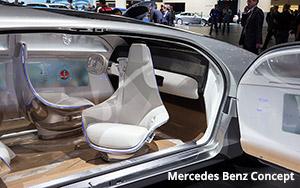 Consumers may be warming to the idea of self-driving cars.
Consumers may be warming to the idea of self-driving cars.
Testing a self-driving car and even replacing their current vehicle with one interests the majority of consumers, according to a
new national study.
The study, conducted by the Consumer Technology Association (CTA), is in direct contrast to numerous other studies. This one is based on a survey of 2,000 U.S. adults who
drove a car or truck in the last 30 days.
The self-driving car is one of the most controversial elements of the Internet of Things, with industry heavyweights like Google and Uber pushing
ahead in tests of the technology and many consumers saying they have no plans to ever own one.
How this ultimately shakes out could impact marketing and advertising both in major ad spends
promoting the vehicles and in the creation of new, in-car infotainment to occupy consumers in cars who aren’t necessarily watching the road ahead.
advertisement
advertisement
Almost three quarters (70%) of
consumers expressed at least some interest in getting a test ride in a self-driving car. Here’s the consumer interest level for a test ride:
- 44% -- Very interested
- 26%
-- Moderately interested
- 16% -- Slightly interested
- 14% -- Not at all interested
While interest in a test ride in a self-driving car may not necessarily reflect
more than curiosity, the majority of consumers in the CTA survey also are interested in replacing their current vehicle with one. Here’s the consumer interest level in replacing the car or truck
they own, rent or lease with a completely self-driving vehicle:
- 34% -- Very interested
- 28% -- Moderately interested
- 17% -- Slightly interested
- 21% -- Not
at all interested
Of those interested in replacing their current vehicle with one that drives itself, 43% consider themselves to be early adopters and almost half (49%) have an income
of $75,000 or more.
An earlier study of more than 3,000 consumers conducted by Kelley Blue Book found that the majority of consumers do not believe they will ever own a self-driving car. This
was true for both millennials (60%) and baby boomers (77%).
Yet another earlier study of 1,100 U.S. youths aged 8 to 18 conducted by Harris Poll for Nielsen found that the majority (63%) of
youngsters would prefer to do the driving rather than letting the vehicle handle the task.
And the older a person gets, the more they want to drive themselves, according to that study. As they
start to get behind the wheel legally, most (77%) current youth drivers prefer to do the driving themselves.
The CTA study found that consumers also look favorably on driver assistance
features. Here are the features that drivers without the features now would want to upgrade to:
- 63% -- Collision avoidance
- 54% -- Lane departure warning
- 46% --
Automatic parking
- 37% -- Adaptive cruise control
The rubber won’t hit the road until actual connected, self-driving cars are available for purchase or lease after a
myriad of issue are tackled and if they can be resolved.
The market then will determine if there’s a gap between what consumers say and what they do.